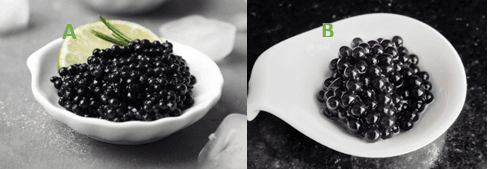
Caviar is one of the most expensive and esteemed aquatic products worldwide. This product is obtained from female sturgeons, which reach their reproductive cycle at 7 to 8 years of age.
In this regard, competition in the international market, high production costs, and other challenges have led to the development and consumption of caviar substitutes.
The creation and development of new edible products, as well as the ability to innovate, are vital and competitive tools for anyone working in the food industry.
During the processing of fish fillets, a large amount of waste is generated. In this sense, the waste from fish and seafood processing constitutes a good source for creating and developing new food products.
Researchers from the Federal University of Piauí, Agricultural Defense Agency of Maranhão, Federal Institute of Maranhão, Federal University of Ceará, and Federal Institute of Piauí have developed “molecular caviar” based on hydrolyzed collagen from tilapia skin.
“Molecular caviar” imitates the caviar obtained from sturgeon. The researchers evaluated the commercial and sensory perception of “molecular caviar.”
Collagen from Tilapia Skin
Tilapia skin is traditionally removed during processing; however, tilapia skin is rich in collagen and has a specific amino acid composition with high content of glycine, proline, and hydroxyproline.
Collagen can promote metabolic processes, reduce intestinal inflammation, aid in skin regeneration, wound healing, and reduce intestinal inflammation, among others.
On the other hand, hydrolyzed collagen from tilapia skin has a fibrillar and polymeric nature that can be used in various applications such as generating biomaterials and manufacturing new foods.
Stay Always Informed
Join our communities to instantly receive the most important news, reports, and analysis from the aquaculture industry.
Molecular Caviar
According to the study results, the “molecular caviar” extracted using the direct spherification technique has a spherical shape, black color, and a shiny, gelatinous appearance.
“The encapsulation of hydrolyzed collagen from tilapia skin using sodium alginate occurs successfully, demonstrating its biocompatibility and ability to form a hydrogel through ionic crosslinking with divalent cations,” report the researchers.
Consumer Profile
Understanding the consumer profile is important to create an opportunity for the launch and success of a new food product.
The researchers identified the consumer profile through a survey that was answered by 185 people. Of the respondents, 69.2% were unfamiliar with caviar, and 62.7% did not know it was extracted from female sturgeon.
“The results show that among the respondents, only 33.5% have consumed caviar or its substitutes at festive events (21.1%) or Japanese restaurants (15%), and the frequency of consumption was at least once a year (36.2%),” they report.
Furthermore, the survey results highlight that the majority of consumers in the study were young adults, aged between 30 and 40 years old, indicating an audience that is more likely to consume foods that provide health benefits.
Purchase Intent of “Molecular Caviar”
In evaluating the appearance of the new product, the respondents assessed aspects of color, shape, and size.
“Regarding the color of the new product, 33% of the respondents said it was ‘strong’ compared to the original caviar, 30.8% considered it ‘very strong,’ and 24.8% as ‘ideal,'” they report.
The researchers asked the respondents about the product presentation and their intention to purchase, and they highlight that the majority of respondents indicated they were interested in buying the caviar substitute at a much lower price than the original.
Conclusion
“The molecular caviar made from hydrolyzed collagen from tilapia skin has a high level of acceptability and purchase intent, with greater interest from women, young adults, higher education, and income,” they conclude.
They also emphasize that the product has a high marketing potential and represents an opportunity to increase the consumption of hydrolyzed collagen to strengthen healthy consumption habits and provide a sustainable alternative to sturgeon caviar.
Contact
Robson Alves da Silva
Department of Food Technology
Federal Institute of Piauí
Liberty Square, 1597, Teresina,
Piauí, Brazil
Email: robson@ifpi.edu.br
Reference (open access)
Brandão TM, Mendes NKM, Candeira WKA, et al. Molecular caviar” of hydrolyzed collagen from tilapia skin: marketing and sensory perception. MOJ Food Process Technols. 2023;11(1):43-49. DOI: 10.15406/mojfpt.2023.11.00278
Editor at the digital magazine AquaHoy. He holds a degree in Aquaculture Biology from the National University of Santa (UNS) and a Master’s degree in Science and Innovation Management from the Polytechnic University of Valencia, with postgraduate diplomas in Business Innovation and Innovation Management. He possesses extensive experience in the aquaculture and fisheries sector, having led the Fisheries Innovation Unit of the National Program for Innovation in Fisheries and Aquaculture (PNIPA). He has served as a senior consultant in technology watch, an innovation project formulator and advisor, and a lecturer at UNS. He is a member of the Peruvian College of Biologists and was recognized by the World Aquaculture Society (WAS) in 2016 for his contribution to aquaculture.







